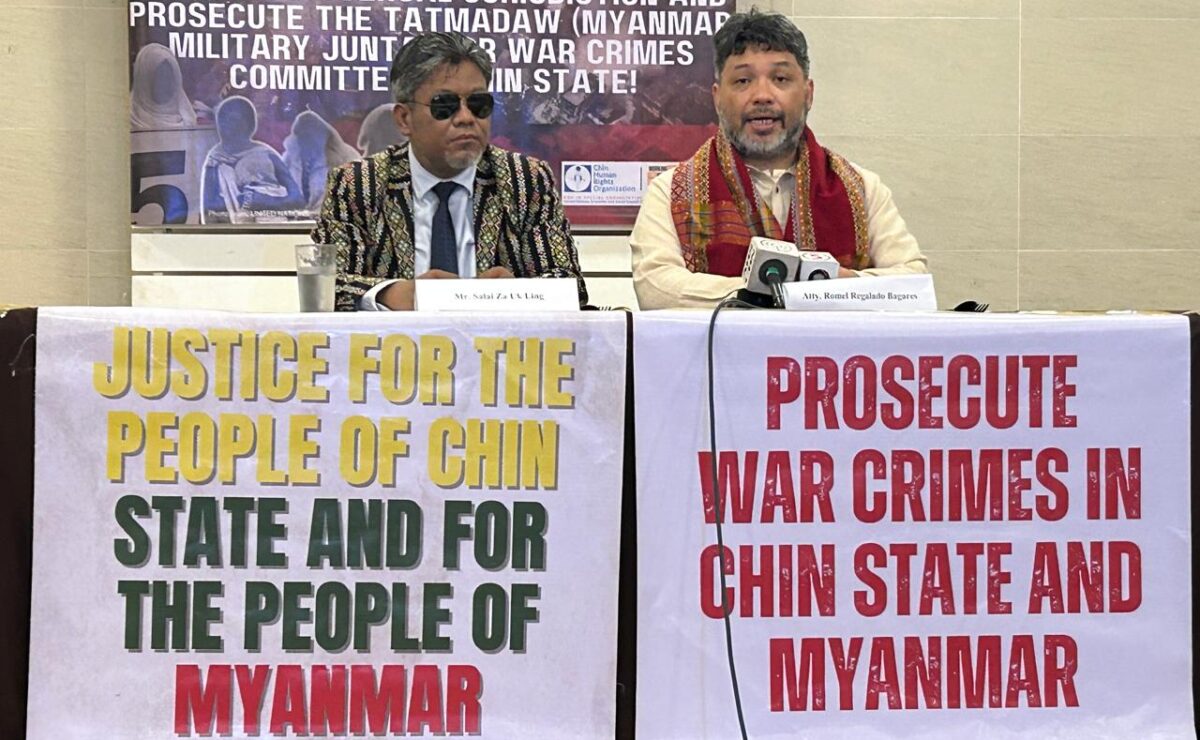Myanmar war crimes victims urge PH’s DOJ to act on case

Salai Za Uk Ling, executive director of the Chin Human Rights Organization and Atty. Romel Bagares urges the DOJ to act on their war crimes case vs. military junta in Myanmar citing principle of universal jurisdiction. Photo of Tetch Torres-Tupas
MANILA, Philippines — Victims of war crimes in Myanmar have asked the Philippine Department of Justice (DOJ) to act on their case against the military junta.
The war crimes complaint was filed in October 2023. However, the DOJ did not open the file, and it remained undocketed.
Instead, a February 22, 2024 letter from the National Prosecution Service (NPS) stated that their complaint does not fall under Philippine jurisdiction.
“Our office’s careful review of the Joint Criminal Complaint-Affidavit reveals that: one, none of your clients are Filipino citizens, none of the accused is present in the Philippines,” read the letter.
“None of the alleged acts was committed against a Filipino citizen. Clearly, then, this Office cannot take cognizance of the matter since the conditions set forth in Section 17 of Republic Act 9851 for the State to exercise jurisdiction are not present,” it further stated.
Section 17 of RA 9851, or the Philippine Act on Crimes Against International Humanitarian Law and Crimes Against Humanity, provides that the State shall exercise jurisdiction over persons, whether military or civilian, suspected or accused of a crime defined and penalized in this Act…under the following conditions:
- The accused is a Filipino citizen
- The accused, regardless of citizenship or residence, is present in the Philippines
- The accused has committed the said crime against a Filipino citizen.
An appeal was filed in 2024, but Salai Za Uk Ling, executive director of the Chin Human Rights Organization, which represents the Chin people, said the DOJ has not yet acted on their appeal.
Complainants’ counsel, Atty. Romel Bagares, explained that the DOJ can act on their case under the principle of universal jurisdiction.
“By mandatory universal jurisdiction we mean that whenever such serious crimes of international concern are brought before Philippine prosecutorial authorities, under Philippine law, they have a legal duty to investigate and— where the evidence allow— prosecute the crimes before Philippine courts, regardless of the perpetrators’ nationality and where they may be,” complainants said in their motion to resolve filed Wednesday.
“The complaint may be accepted in any jurisdiction. Those who violate international standards should have no place to hide because it is in the international community’s interest to protect everyone’s rights,” Bagares told reporters in Filipino.
He added that “mandatory universal jurisdiction” means that all the States are obligated to investigate allegations of war crimes.
But with the arrest of former President Rodrigo Duterte, Bagares said: “The Philippines under President Bong Bong Marcos has just shown ASEAN and the world great leadership in advancing international accountability.”
“We trust that his administration will open ways towards a mechanism for international accountability for atrocities in the ASEAN region more generally, including against the Myanmar junta, even if preliminarily,” he said.
He added that they are prepared to take their case to the Supreme Court if needed.